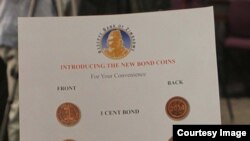In Zimbabwe, the central bank says the country will introduce bond notes to the mix of currencies used by consumers by the end of October.
Six years ago, Zimbabwe had an inflation rate of over two 200 million percent. Since then, it has relied on the US dollar, South African rand and others as local currencies.
But dollars are in short supply and President Robert Mugabe says the new notes will help prevent foreigners from taking US dollars out of the country.
John Robertson, an economist and consultant in Harare, says the new notes could lead to shortages. For example, he says most consumer goods, including gasoline, are imported – and the new notes cannot be used to purchase imports.
He says the manufacturing, agricultural and other productive sectors cannot provide a sufficient quantity of consumer goods for the domestic market. Farmers are not likely to be able to meet everyday food needs: under the government’s agricultural reforms, farmers cannot use land as collateral (and so cannot boost production).
Robertson says the bond notes should not lead to inflation. The government has promised not to print more than 200 million bond notes (less than one dollar per day for each Zimbabwean).
He says some, though, wonder if the government will keep its promise. (VOA's Bill Eagle interviewed Robertson and below is the full-transcript)
Q: What will be the effect of the bonds?
A: It really just treats the symptoms of the problem – (mainly) that we lack the cash.
As a developing country, we are a bit of an exception in the world because countries that want to earn hard currency would normally have to deal with strong economies. But here in Zimbabwe, you can earn US dollars by having something to sell to the Zimbabwe population. And, US dollars are very popular in China and India and other countries, so the shipment of US dollars out of the country in physical notes has caused a massive cash scarcity.
But that’s been worsened by the fact that we have a huge trade deficit, and that’s because we’ve closed down much of productive sectors – manufacturing and agriculture are nearly dead, the mining sector is sort of functioning, but not very well. We used to produce most of the consumer goods that we required and today we’re importing them. We’re sending money (dollars) out of the country to pay for them, and over a period this has strained the resources we had and the money we earned from exports; it’s drained our savings and now we’ve got very little left.
The US dollars you can get from the bank every day are rationed …and that scarcity is to be overcome by the bond notes. [Authorities] are right in thinking that nobody outside the country is going to want to take bonds notes out of Zimbabwe, and these will remain here.
Q: The government once before had used bond notes in 2009 when you had over an inflation rate of over 200 million percent. Could that happen again?
A: It could do.
In those days, it was the Zimbabwe dollar that we had. [We ruined] the Zimbabwe dollars by printing many hundreds of trillions of them and we destroyed the value. That’s because the government couldn’t raise the value needed to meet its tax obligations and expenditures. So they simply decided to print more. That’s always been the case in history: if you print more money than your money supply can handle the value will go down, and we came close to breaking the world record for inflation.
It could happen with the (new) bonds if they printed a large number of them. The government is claiming at the moment that it will not increase the print order above 200 million dollars’ worth of bond notes. At that rate, it’s not a big sum of money spread among a population of 14 million Zimbabweans. It would be less than a dollar per person per month.
But if they hold the order to only 200 million dollars and it takes another year to get into circulation, I think that’s not going to present a risk of a value collapse. But whether we can trust the government to restrain themselves and not print any more of these notes that is the real question.
Q: If the bond notes are released at the end of October, what effect would that have on ordinary Zimbabweans?
A: The bond notes will not be useful for purchasing imported goods. You have to pay for those with US dollars, rands or foreign currency. So no one will be able to replace their stock and so on if they try to pay in bond notes.
That would apply to fuel as well. Those buying gasoline will not be able to do so if they are offering bond notes and the service stations are not able to use bond notes to refresh their stock.
I think it is going to lead to scarcities.
Food items make up more than 30 percent of normal spending. So if you are talking about the milling industry or those doing canned good (like) canned tomatoes, bottle-filled ketchup or soft drinks, the quantities today from what’s left of (our) farming sector is just not enough.
We do have more farmers on the land but they can not produce. That’s another of the issues – that the farmers have no access to money. The land was taken off the market and can no longer be used as security for bank loans. The farmers have been disabled – they’re new farmers with little experience in the first place. But they haven’t been able to function properly because the financing arrangements used to be very robust and effective in Zimbabwe. They’ve been destroyed by the land reform program, which effectively nationalized the land and so now all of it belongs to the government and can not be used as collateral for bank loans.




